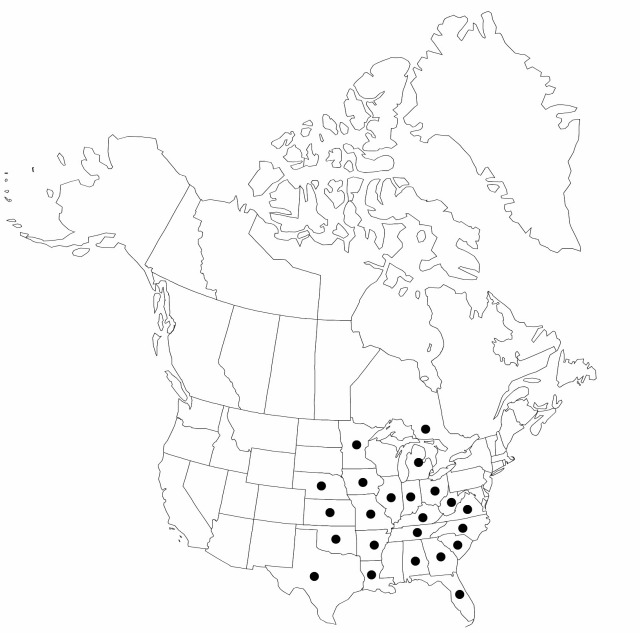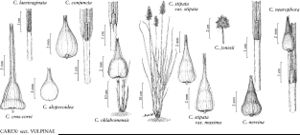Difference between revisions of "Carex crus-corvi"
in G. Kunze, Suppl. Riedgräs., 128. 1842.
FNA>Volume Importer |
FNA>Volume Importer |
||
| Line 11: | Line 11: | ||
|name=Carex bayardii | |name=Carex bayardii | ||
|authority=Fernald | |authority=Fernald | ||
| − | }}{{Treatment/ID/Synonym | + | }} {{Treatment/ID/Synonym |
|name=Carex crus-corvi var. virginiana | |name=Carex crus-corvi var. virginiana | ||
|authority=Fernald | |authority=Fernald | ||
| Line 29: | Line 29: | ||
|elevation=0–1000 m | |elevation=0–1000 m | ||
|distribution=Ont.;Ala.;Ark.;Fla.;Ga.;Ill.;Ind.;Iowa;Kans.;Ky.;La.;Mich.;Minn.;Mo.;Nebr.;N.C.;Okla.;Ohio;S.C.;Tenn.;Tex.;Va.;W.Va. | |distribution=Ont.;Ala.;Ark.;Fla.;Ga.;Ill.;Ind.;Iowa;Kans.;Ky.;La.;Mich.;Minn.;Mo.;Nebr.;N.C.;Okla.;Ohio;S.C.;Tenn.;Tex.;Va.;W.Va. | ||
| − | |discussion=<p>Primarily a species of the Mississippi drainage, Carex crus-corvi also occurs along the coastal plain.</p> | + | |discussion=<p>Primarily a species of the Mississippi drainage, <i>Carex crus-corvi</i> also occurs along the coastal plain.</p> |
|tables= | |tables= | ||
|references= | |references= | ||
| Line 53: | Line 53: | ||
|publication year=1842 | |publication year=1842 | ||
|special status= | |special status= | ||
| − | |source xml=https://jpend@bitbucket.org/aafc-mbb/fna-data-curation.git/src/ | + | |source xml=https://jpend@bitbucket.org/aafc-mbb/fna-data-curation.git/src/8f726806613d60c220dc4493de13607dd3150896/coarse_grained_fna_xml/V23/V23_461.xml |
|genus=Carex | |genus=Carex | ||
|section=Carex sect. Vulpinae | |section=Carex sect. Vulpinae | ||
Revision as of 16:08, 18 September 2019
Plants with basal sheaths of previous year persistent, entire. Culms to 90 cm × 5 mm, scabrous. Leaves: sheaths all with blades, fronts smooth, red spotted, indistinctly linearly veined, apex red-brown, membranous, truncate, minutely ciliate; ligules rounded, 2 mm, free limb to 0.5 mm; blades glaucous, not epistomic, to 90 cm × 12 mm. Inflorescences densely spicate, cylindric, elongate, with 15–25 distinguishable branches, 10–20 × 6 cm; proximal internode to 10 mm; proximal bracts setaceous, apparent. Scales hyaline. Perigynia pale brown, red-brown distally, 10–12-veined abaxially, 5-veined adaxially, to 8 mm, body to 1.2 mm wide, base to 2.2 mm wide, base distended proximally forming disk, cordate; stipe to 0.9 mm; beak to 4.5 mm, mouth deeper abaxially, serrulate, apical teeth somewhat spreading. Achenes ovate, 2.5 × 1.4 mm; stalk to 0.2 mm; persistent style base cylindric, 0.3 mm. 2n = 52.
Phenology: Fruiting May–Aug.
Habitat: Seasonally saturated or inundated soils in wet meadows, marshes, swamps, alluvial bottomlands
Elevation: 0–1000 m
Distribution

Ont., Ala., Ark., Fla., Ga., Ill., Ind., Iowa, Kans., Ky., La., Mich., Minn., Mo., Nebr., N.C., Okla., Ohio, S.C., Tenn., Tex., Va., W.Va.
Discussion
Primarily a species of the Mississippi drainage, Carex crus-corvi also occurs along the coastal plain.
Selected References
None.
